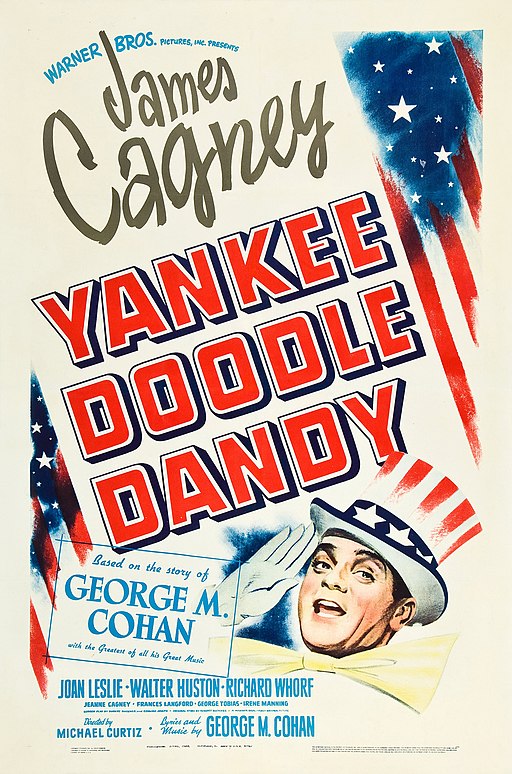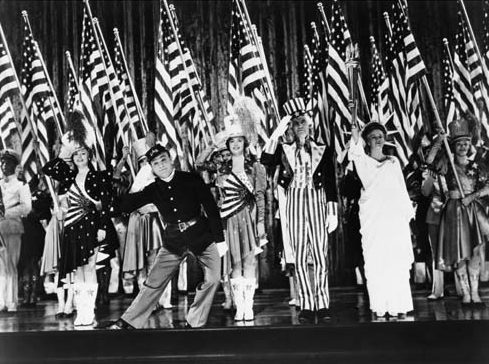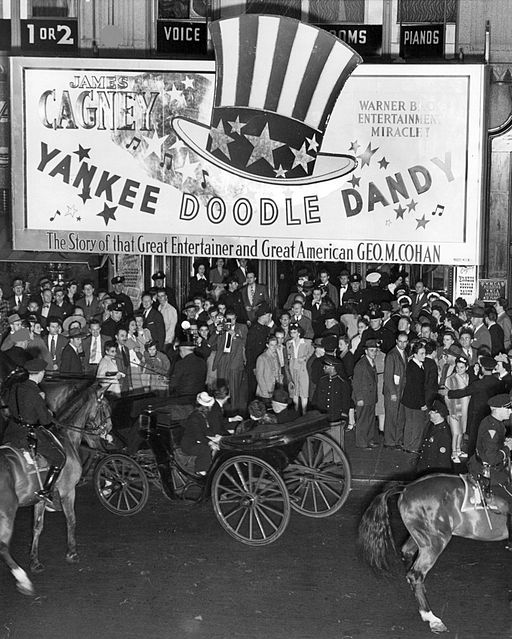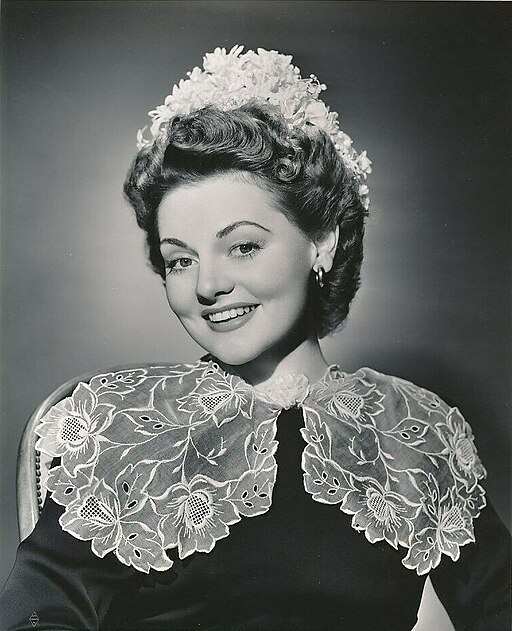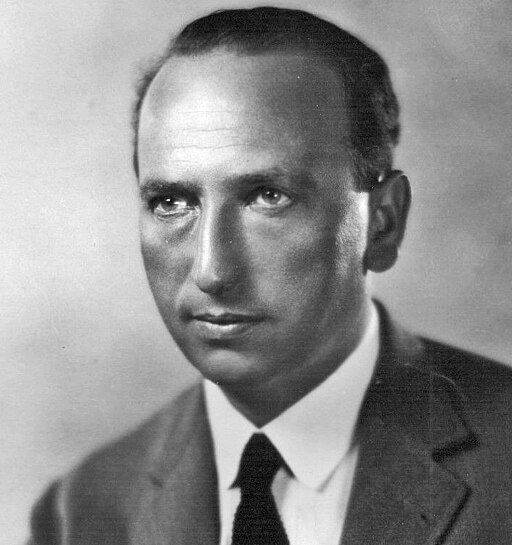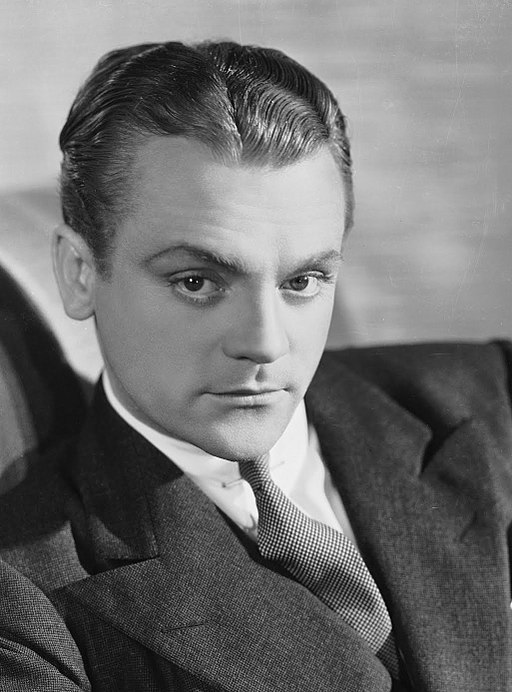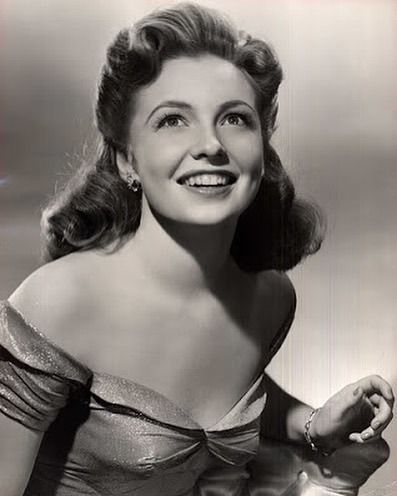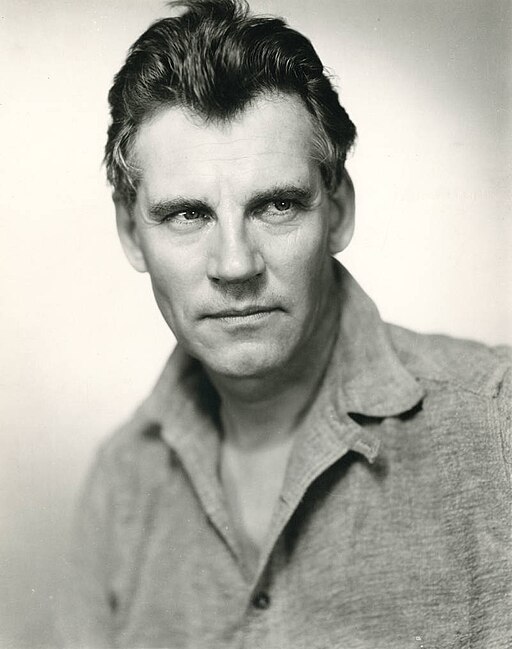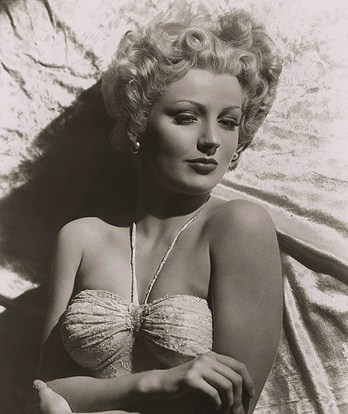Yankee Doodle Dandy - 1942
back| Released by | Warner Bros. |
| Director | Michael Curtiz |
| Producer | Jack Warner, Hal B. Wallis, and William Cagney |
| Script | Robert Buckner and Edmund Joseph |
| Cinematography | James Wong Howe |
| Music by | George M. Cohan (original songs), Ray Heindorf and Heinz Roemheld (musical direction) |
| Running time | 126 minutes |
| Film budget | $1,5 million |
| Box office sales | $11.8 million |
| Main cast | James Cagney - Joan Leslie - Jeanne Cagney - Walter Huston - Richard Whorf |
Yankee Doodle Dandy
A Musical Celebration of George M. Cohan's mark on American Entertainment
"Yankee Doodle Dandy" is a biographical musical film that tells the story of George M. Cohan, a renowned entertainer, playwright, composer, lyricist, actor, singer, dancer, and producer known as "The Man Who Owned Broadway."
The film is celebrated for its patriotic themes, energetic musical numbers, and James Cagney's dynamic performance, which earned him the Academy Award for Best Actor. The film itself was a critical and commercial success, serving as a morale booster during World War II. It remains a classic of the Golden Age of Hollywood, notable for its contribution to the musical genre and its historical significance in American cinema.
Related
Yankee Doodle Dandy – 1942
Summary:
"Yankee Doodle Dandy" is a vibrant and spirited biographical musical film that chronicles the life and career of George M. Cohan, portrayed with electric energy by James Cagney. The film opens with an older Cohan being summoned to the White House by President Franklin D. Roosevelt, who wishes to commend him for his contributions to American entertainment and patriotic spirit. This meeting frames the narrative, as Cohan recounts his life story, beginning with his early days in vaudeville as part of the family act, "The Four Cohans," along with his parents and sister.
The movie vividly captures the ups and downs of Cohan's career, showcasing his rise from a vaudeville performer to a Broadway legend. It delves into his ambitions, relationships, and the creation of his iconic songs such as "Yankee Doodle Boy," "Give My Regards to Broadway," and "You're a Grand Old Flag." Cagney's portrayal of Cohan is both dynamic and nuanced, capturing the man's relentless drive, patriotic fervor, and complex personality.
As the story unfolds, viewers see Cohan's battles to get his work produced, his eventual breakthroughs, and his innovations in the theater. His personal life, including his marriage to Mary (Joan Leslie), is woven into the narrative, highlighting his human side amidst the showbiz triumphs. The film also touches on Cohan's later years, including his retirement and comeback.
Analysis of the Film
Performance: James Cagney's performance is the heart of "Yankee Doodle Dandy." Known primarily for his roles as a tough guy in gangster films, Cagney's turn as the song-and-dance man George M. Cohan was a departure that showcased his versatility and won him an Academy Award for Best Actor. His energetic tap dancing, precise timing, and charismatic screen presence breathe life into Cohan's character, making the film a memorable watch.
Direction and Production: Directed by Michael Curtiz, known for his work on "Casablanca," the film benefits from Curtiz's adept storytelling and dynamic pacing. The production, under Warner Bros., is marked by lavish sets, stunning cinematography by James Wong Howe, and meticulous attention to period detail, recreating the early 20th century and Broadway with authenticity and flair.
Music and Choreography: The film's music, featuring George M. Cohan's songs, is integral to its appeal. The musical numbers are staged with exuberance, showcasing the patriotic zeal and Broadway razzle-dazzle that Cohan was famous for. The choreography, combined with Cagney's spirited performances, makes these moments stand out as highlights of the film.
Themes and Legacy: "Yankee Doodle Dandy" explores themes of patriotism, perseverance, and the power of show business to inspire and unite. Its release during World War II provided a morale boost to American audiences, reinforcing the film's patriotic message. The film's legacy is not only that of a biographical portrait of George M. Cohan but also as a timeless celebration of American music, theatre, and national identity. It remains a quintessential American musical, a testament to the enduring appeal of Cohan's work, and a showcase for Cagney's remarkable talents.
In conclusion, "Yankee Doodle Dandy" stands out as a masterful blend of biography, music, and patriotism. Its portrayal of George M. Cohan's life is both a personal and professional journey, encapsulated within the broader narrative of American cultural history. Through its memorable performances, iconic music, and resonant themes, the film has earned its place as a classic in American cinema, continuing to captivate audiences with its story of an entertainment legend.
Official Trailer Yankee Doodle Dandy:
Movie Cast “Yankee Doodle Dandy”:
- James Cagney as George M. Cohan
- Joan Leslie as Mary
- Walter Huston as Jerry Cohan, George's father
- Richard Whorf as Sam Harris, Cohan's producing partner
- Irene Manning as Fay Templeton, a Broadway star
- George Tobias as Dietz, a theatrical agent
- Dolores Moran as Singer
- Rosemary DeCamp as Nellie Cohan, George's mother
- Jeanne Cagney as Josie Cohan, George's sister
- Frances Langford as Nora Bayes, a singer
- George Barbier as Erlanger
- S.Z. Sakall as Schwab
- Walter Catlett as Theatre Manager
- Douglas Croft as George M. Cohan, age 13
- Eddie Foy Jr. as Eddie Foy
- Minor Watson as Albee
- Chester Clute as Stage Manager
- Odette Myrtil as Madame Bartholdi
Masterful Direction of Michael Curtiz:
Michael Curtiz's direction of "Yankee Doodle Dandy" (1942) stands as a testament to his versatility and masterful storytelling abilities. Known for his ability to work across a wide range of genres, Curtiz brought a distinctive blend of visual flair, narrative pacing, and emotional depth to this biographical musical film, showcasing the life and career of George M. Cohan.
Visual Storytelling
Curtiz was adept at using the camera to tell stories in visually compelling ways. In "Yankee Doodle Dandy," he utilized dynamic compositions and movements to accentuate the film's musical numbers and dramatic moments. His use of lighting and shadows contributed to the emotional weight of scenes, highlighting the contrasts between the public persona of Cohan and his private struggles. The film's visual style, under Curtiz's guidance, seamlessly blends the spectacle of Broadway with the intimacy of Cohan's personal journey.
Narrative Pacing
Curtiz's management of the film's pacing is exemplary. Despite the potentially sprawling nature of a biographical film that covers many years, "Yankee Doodle Dandy" maintains a brisk, engaging pace. Curtiz skillfully balances the film's dramatic, comedic, and musical elements, ensuring that each scene transitions smoothly into the next. This pacing keeps the audience invested in Cohan's story, from his early days in vaudeville to his triumphs on Broadway and his reflections in later life.
Emotional Depth
One of Curtiz's strengths as a director is his ability to draw out deep emotional resonance from the script and his actors. In "Yankee Doodle Dandy," he works closely with James Cagney to explore the complexities of George M. Cohan's character. Curtiz's direction allows Cagney to deliver a performance that is not only energetic and charismatic but also nuanced and reflective. The director's focus on the emotional undercurrents of Cohan's relationships with his family, colleagues, and the love of his life adds a rich layer of depth to the film.
Collaboration with Cast and Crew
Curtiz was known for his demanding nature but also for his ability to collaborate effectively with cast and crew to achieve his vision. His work with cinematographer James Wong Howe on "Yankee Doodle Dandy" is a prime example, as they crafted a visually stunning film that complements the narrative and performances. Curtiz's collaboration with the film's composers and choreographers ensured that the musical numbers were not only entertaining but also integral to the story's progression.
Legacy
Michael Curtiz's direction of "Yankee Doodle Dandy" contributed significantly to its status as a classic American film. His ability to weave together the strands of George M. Cohan's life into a coherent, engaging, and emotionally resonant narrative demonstrates his directorial prowess. The film's success further cemented Curtiz's reputation as one of Hollywood's most versatile and accomplished directors, capable of mastering a wide range of cinematic forms and genres.
Splendid Performance of James Cagney:
James Cagney's performance in "Yankee Doodle Dandy" (1942) is widely regarded as a career-defining role, showcasing his exceptional talent and versatility as an actor. Best known for his portrayals of tough characters in gangster films, Cagney's portrayal of George M. Cohan, the renowned songwriter, performer, and playwright, allowed him to display a different aspect of his acting prowess. His performance in this film not only earned him the Academy Award for Best Actor but also solidified his place in cinematic history as one of the greats of the Golden Age of Hollywood.
Energy and Dynamism
Cagney brought an infectious energy and dynamism to the role of George M. Cohan. His portrayal is filled with vigor, from the spirited tap dancing to the enthusiastic renditions of Cohan's songs. Cagney's physicality in the dance sequences is particularly noteworthy; despite not being a trained dancer, his movements are precise, confident, and full of flair, embodying the showmanship of Cohan himself. This energy transcends the screen, engaging the audience and drawing them into the world of early 20th-century Broadway.
Emotional Range
Beyond the energetic musical numbers, Cagney demonstrates a significant emotional range in "Yankee Doodle Dandy." He adeptly navigates the complexities of Cohan's character, capturing his ambition, patriotism, and occasional arrogance, as well as his vulnerability and depth of feeling in more intimate moments. Cagney's ability to shift seamlessly between these emotional states adds a rich layer of depth to his portrayal, making his Cohan a fully realized and relatable character.
Charisma and Screen Presence
Cagney's charisma is a key element of his performance. He commands the screen with a magnetic presence, whether he's delivering a patriotic song, engaging in rapid-fire dialogue, or sharing a tender moment with Joan Leslie's character, Mary. His charm and wit are integral to the character of George M. Cohan, and Cagney delivers on every front, making it impossible to imagine anyone else in the role.
Authenticity and Commitment
One of the hallmarks of Cagney's performance is his authenticity and commitment to the role. He approached the character of George M. Cohan with a deep respect and dedication, immersing himself in the study of Cohan's life and work. This commitment is evident in every scene, as Cagney captures the essence of Cohan's spirit, from his patriotic fervor to his dedication to the theatrical craft. Cagney's portrayal is not just an imitation but a heartfelt tribute to one of America's most beloved entertainers.
Impact and Legacy
James Cagney's performance in "Yankee Doodle Dandy" left a lasting impact on the film industry and on audiences worldwide. It demonstrated his versatility as an actor, breaking away from the typecasting that often limited actors of his era. His portrayal of George M. Cohan has been celebrated for its vibrancy, emotional depth, and authenticity, contributing to the film's status as a classic American musical. Cagney's performance in this role remains a benchmark for actors in biographical films and musicals, showcasing the power of transformative acting to bring historical figures to life on the silver screen.
Memorable Quotes from the Movie:
"My mother thanks you. My father thanks you. My sister thanks you. And I thank you." - This quote is repeated several times by James Cagney's character, George M. Cohan, throughout the film. It's a line Cohan himself used in real life, and it encapsulates his appreciation for his audience and his humble beginnings.
"It was a great show, with a great finale. And, like every great finale, it was an American flag." - This line reflects Cohan's deep patriotism and his love for incorporating the American flag into his performances.
"I was a Yankee Doodle Dandy, a Yankee Doodle do or die. A real live nephew of my Uncle Sam, born on the Fourth of July." - Part of the lyrics from one of Cohan's most famous songs, "Yankee Doodle Boy," this quote embodies the patriotic fervor that defined much of Cohan's work.
"Give my regards to Broadway, remember me to Herald Square." - Another quote from one of Cohan's famous songs, this line speaks to his deep connection to the world of theater and his lasting impact on Broadway.
"We're the first to carry the flag into a foreign country. And that flag is still there." - This line underscores the theme of American patriotism and pride that runs throughout the film.
"You're a grand old flag, you're a high flying flag and forever in peace may you wave." - Yet another memorable line from one of Cohan's patriotic songs, reflecting his love for the United States.
"I don't care what you say about me as long as it isn't true." - This witty retort by Cohan demonstrates his quick wit and resilience in the face of criticism.
Awards and Recognition:
Academy Awards (1943)
- Won: Best Actor in a Leading Role for James Cagney. This win is often cited as one of the most deserved in Oscar history, recognizing Cagney's dynamic and charismatic portrayal of George M. Cohan.
- Won: Best Sound Recording for Nathan Levinson. The award acknowledged the film's exceptional sound design, crucial for a musical.
- Won: Best Music, Scoring of a Musical Picture for Ray Heindorf and Heinz Roemheld. The music played a pivotal role in the film, featuring many of George M. Cohan's timeless songs.
- Nominated: Best Picture. The film was recognized in the top category, underscoring its overall quality and the high regard in which it was held by the industry.
- Nominated: Best Director for Michael Curtiz. This nomination highlighted Curtiz's masterful direction, bringing together complex production elements to create a cohesive and engaging film.
- Nominated: Best Writing, Original Story for Robert Buckner. The screenplay was lauded for its wit, warmth, and structure, effectively conveying Cohan's life story.
- Nominated: Best Film Editing for George Amy. The nomination recognized the film's seamless editing, crucial for its dynamic pacing and the integration of musical numbers.
Other Awards and Honors
- New York Film Critics Circle Awards: James Cagney won Best Actor, further cementing his performance as one of the finest of the year.
- The film was also selected for preservation in the United States National Film Registry by the Library of Congress as being "culturally, historically, or aesthetically significant." This honor, bestowed years after its release, underscores the film's enduring impact on American culture and cinema.

